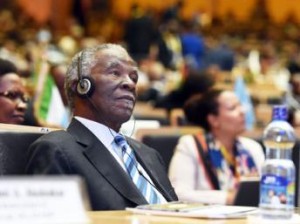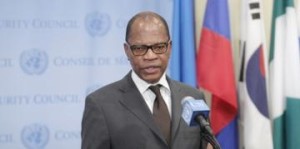“‘Leaked’ documents claimed to show African Union pro-Khartoum bias in Sudan negotiations,” Radio France Internationale, Wednesday 08 April 2015
Thabo Mbeki, chairperson of AUHIP, during African Union summit in Addis Ababa, 31 January 2015
[Also contained within the dispatch is an interview by RFI with several Sudan experts http://www.english.rfi.fr/africa/20150408-sudans-leaked-intelligence-documents-sophisticated-fraud-or-damning-indictment-afric ]
A fiery debate was ignited this week over the authenticity of leaked intelligence documents from the Sudanese government. The minutes from a meeting of high-level government officials and members of the ruling National Congress Party last year allegedly reveals the perceived bias of African Union officials towards Khartoum in mediation efforts.
“This is a strange business, to be in the United States and to be receiving these highly, highly confidential documents,” says Eric Reeves, a professor at Smith College, who has published these documents on his website.
It is the third time Reeves has published allegedly leaked documents and perhaps the most controversial given the disclosures they make about Khartoum’s attitude towards African Union High-Level Implementation Panel (AUHIP) chair Thabo Mbeki, Mohamed Ibn Chambas, former head of the African Union-UN Hybrid Operation in Darfur (UNAMID) and Haile Menkerios, the head of the UN Office to the African Union (UNOAU).
In September, Mbeki, Chambas and Menkerios were leading discussions between the Sudanese government and Sudanese rebel groups, as well as leading dialogue between Sudan and South Sudan over outstanding issues of contention following the independence of South Sudan in 2011. However, according to the allegedly leaked minutes from the same period, the mediators have been doing “exactly what Khartoum wants”, Reeves, who has worked on Sudan for the past 15 years, told RFI.
“They are now under our control,” Sudan Defense Minister Abdelrahim Mohamed Hussein, says of Mbeki, Chambas and Menkerios, in Reeves’ translation of the Arabic text. “These are the ones we use to dismantle the rebellion,” Hussein says, talking of the Sudan Revolutionary Front, an alliance of Sudan’s main rebellion groups. The mediators will “subjugate the South to our will and implement the agreement the way we want”, he says of negotiations with South Sudan over border security, border demarcation and the final status the disputed region of Abyei. |
“All of these envoys promised to submit to the African Union and the United Nations positive reports on Sudan records on human rights and freedoms,” says Hussein, according to Reeves’s documents. Hussein himself is the subject of an international arrest warrant issued by the International Criminal Court for alleged crimes in Darfur, alongside Sudanese President Omar al-Bashir.
Besides the claim in Reeves’ documents that the African mediators side with Khartoum, there are also comments from General Ismat Abdel-Rahman, the Under-Secretary for Presidential Affairs, stating that Mbeki and Chambas should be awarded for their support with “money of the [Sudanese] Islamic Movement that is deposited abroad”.
[ The Arabic text for the minutes of the 10 September 2014 meeting can be found at | http://wp.me/p45rOG-1Fn; the English translation is at | http://wp.me/p45rOG-1Ff ]
So does Reeves think the mediators were given kickbacks?
“I did not say they’d been paid off,” he says. “I did not directly accuse them of being bribed, I only put in context the statement by Khartoum that they really felt deeply grateful and obliged to pay.”
Reeves stands squarely behind the authenticity of his documents. He will not disclose the source but admits that it is the same source that has given him two other sets of high-level documents allegedly leaked from the Sudanese government. The Massachusetts-based professor, who has been highly critical of the Sudanese authorities, says a source within South Sudan’s government has also confirmed to him that the documents are authentic.
[Expert commentary on the authenticity of the minutes may be found at | http://wp.me/p45rOG-1w5 —ER]
Not everyone agrees. Alex de Waal, Executive Director of the World Peace Foundation, dismisses Reeves’ documents as a fraud. “Anyone familiar with the government of Sudan knew instantly that this document was a forgery,” de Waal told RFI in an email. “It was a clever forgery, put together by someone familiar with the attitudes of members of the governing elite in Khartoum,” the respected Sudan expert adds. De Waal was previously a member of the African Union mediation team for Darfur 2005-2006 and served as a senior advisor to the AUHIP 2009-2011.
Other experts have gone to considerable lengths to verify Reeves’ documents. Jean-Baptiste Gallopin, a Sudan specialist at Yale University, spent several weeks analysing one of Reeves’ leaked documents.
He draws attention to the translations and whether inaccuracies could have been introduced. He bases his analysis on the language used, idiosyncrasies in the text, spelling mistakes, the length of the documents, the detail contained within them and the timeline of events described corresponding to actual events.
Gallopin, who previously worked for rights group Amnesty International and a political risk consultancy firm, says a forgery of this scale would require “huge resources and a deep knowledge” of the Sudanese government. This kind of forgery, he says, is “not entirely out of the reach of some intelligence services but I think that’s pretty unlikely”.
The Frenchman highlights a pattern in the alleged leaks and how Reeves’ various documents cover a specific timeframe. Gallopin concludes that the leaked documents as a whole are “very credible” and specifically on Reeves’ latest document can “find no element that would suggest that it’s forged”.
Reeves is aware that he could be charged with serving a particular agenda in publishing these documents, given that it is hard to establish their authenticity. On the other hand, he says he feels compelled to do so because “people’s lives were in danger” in sharing the documents.
South Sudan’s Foreign Minister Barnaba Marial Benjamin told RFI that he had not seen the documents. But he told RFI that Reeves is a “very respected intellectual” and a “knowledgeable professor” who was “concerned about the issues of Sudan and South Sudan”. Benjamin requested that a copy of the documents be sent to his ambassador in Paris.
Sudanese Foreign Minister Ali Karti was not reachable by telephone for reaction.
Thabo Mbeki did not respond to a request for comment via the communications team of AUHIP.
Contacted by RFI, the chief of communications for the UN Office for West Africa, Mohamed Ibn Chambas, previously of UNAMID, declined comment.
Haile Menkerios was not reachable by telephone or email for reaction.

